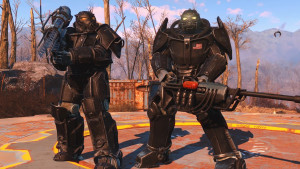Please support Game Informer. Print magazine subscriptions are less than $2 per issue
Building A Better Sci-Fi Game

When it comes to video games, sci-fi fans have always been blessed. Not only has there always been an abundance of games set in the final frontier, but select sci-fi franchises have played an important role in the industry. Shooters like Halo, Resistance, and Killzone have been trumpeted by Microsoft and Sony as reasons to buy their respective consoles, and there's no shortage of gamers who would call Mass Effect their favorite current-gen RPG series and StarCraft II their favorite RTS. But whenever I play a game set "where no man has gone before," I can't help feeling to the contrary, due to some key sci-fi characteristics that haven't been fully explored by the industry. Caution: This will be the nerdiest thing you read today.

Flexing Your Creative
Muscle:
To me, the most valuable attribute that a sci-fi story affords
its creators and consumers is the unabashed creativity that the fiction can
support. When you're dealing with outer space, no sci-fi gadget is too
impractical and no alien too ridiculous. The original Star Trek television series reveled in its own absurdity, and was the
better for it, but most sci-fi games are surprisingly practical.
It's not that franchises like Halo and Resistance lack creativity, but many of their design choices feel like they're driven by necessity, with aliens broken down into familiar enemy types, and weapons that conform to common gameplay mechanics. I don't just want to play a game with creative elements -- I want a game that celebrates its creativity.
The Mass Effect series does an admirable job of striking a Star Trek-esque vibe with its wide array of sentient species -- you never know what kind of strange creature you'll encounter at the next space port. Unfortunately, you only interact with most of these creatures through a dialogue tree, and Mass Effect's gameplay is standard fare.
Making a game that plays well will always be a developer's top priority, so it's understandable that some concessions need to be made when crafting an out-of-this-world adventure. However, if you really want to capture the attention of a sci-fi nerd like me, don't be afraid to have fun with your fiction. Seemingly impractical design choices can spark interesting histories and politics for your aliens and worlds. It's better to be campy and interesting than too serious and boring.

Space Is The Place:
Here's the thing: a lot of science fiction may be full of ultra-powerful
weapons and exotic alien babes, but there's really only one fantasy that
defines the genre -- exploring the unknown. When Luke stares wistfully at Tatooine's
setting suns, he's not thinking about how to best conserve his ammo or what ship
upgrades he wants to invest in. He's yearning to experience something beyond the
constraints of his boring life. In a way, that's the same reason many of us
play video games, but somehow sci-fi games always seem to muck up their sense
of exploration and discovery.
Both installments of Mass Effect managed to make exploring the galaxy a grind. The Mako sequences from the first game let you feel what it was like to set foot on an alien world, but every planet you went to was painfully barren. It may have been realistic from a scientific standpoint, but if exploring a planet is so boring that it feels like a chore, you've missed the point.
In a way, Mass Effect 2 was even worse; it forwent hands-on exploration for a tedious mineral scanning minigame. Occasionally you could land on a planet for an impromptu mission, but these were comprised of linear levels that played out like any other shooter.
Virtually every sci-fi game on the market tasks players with the same mission: Save the planet/galaxy/universe from certain doom! Compare that to the mission of the U.S.S. Enterprise, which most nerds probably have memorized: "To explore strange new worlds, to seek out new life and new civilizations, to boldly go where no man has gone before." Which sounds more fun to you? I've already saved the world more times than I can count -- let me discover a new one instead.

Exploring Minecraft's blocky worlds is more fun than most sci-fi games
As odd as it may sound, the game that I think best captures the excitement of discovering a strange new planet isn't a sci-fi game at all -- it's Minecraft. Every player who starts Mojang's sandbox game is given his or her own unique world, and gameplay strikes a perfect mix between exploration and survival. And you can forget mineral scanning -- Minecraft makes gathering resources fun and rewarding at the same time. Throw in some rudimentary tools that allow you to create your own structures, and it's no wonder over a million gamers have already bought the beta.
If a sci-fi game could translate Minecraft's essence into discovering and colonizing alien worlds, it wouldn't need action-packed set pieces or a plot that places the universe in peril -- the sense of spreading humanity's reach through the galaxy would be satisfying enough. Not that shooting some aliens every now and then would be a bad thing...
Up Next: Ships, Squads, and Space Combat...

A Ship With Soul:
If you're going to be flying around in outer space, you need
a good ship, and this is another area where sci-fi games are something of a
mixed bag. I'm particularly torn on Mass Effect. The series does a good job of
instilling the player with a sense of ownership of the SSV Normandy, but that's based more on Commander Shepard feeling like a
real character than the Normandy feeling
like a real ship.
Television shows like Battlestar Galactica, Firefly, and Star Trek all feature believable vessels because they sell the sense that people actually live in them -- in part by showing what happens when things go wrong. Not only should your game's spaceship contain all of the facilities sci-fi fans would expect to see, but they should be simulated on some basic level as well. If your shields go down during a fight, you know there's probably something wrong in the engine room. If your ship suffers a hull breach while traveling through an asteroid belt, it's time for a spacewalk to investigate the damage. I don't want to be dragged down by an unending list of mundane chores, but there should be some form of gameplay associated with living on your ship, and being a commander should require more than just feeding fish and playing with your space hamster from time to time. Without these elements, the Normandy feels sterile and detached.

Dead Space does a great job at making the Ishimura feel like a real, functioning ship
The most believable video game spaceship that I've seen in recent years is Dead Space's USG Ishimura. To be fair, the Ishimura was a complete game in and of itself, with its floor plan broken down into traditional levels. However, the high level of detail and atmosphere Visceral created (even discounting the horror elements) fully convinced you that people once lived on the Ishimura, and hands-on tasks like reigniting the ship's engine played a major role in the illusion. Having a ship that's large enough to require its own tram line is complete overkill for a game like Mass Effect, but a little more interaction and basic simulation elements would go a long way to making your vessel feel like home. Customization options are always a nice bonus, too.

Human Resources:
A fancy-pants spaceship isn't worth much if you don't have a
crew to pilot it. Mass Effect is once again the prime example of where sci-fi
games are headed: Both titles did a great job of fleshing out your party with
diverse and interesting characters. However, the rest of the Normandy's crew is mostly anonymous.
Unless you're commanding a ship the size of a Battlestar, you should know every character on your ship. Games like Oblivion and Fallout 3 feature towns full of NPCs who have their own unique appearances and daily routines, and I would love to see that level of detail packed into a spaceship. Not every worker needs an extensive back story or multifaceted personality - just having a unique face and name can sell the illusion. Also, make every character mortal, and give players a recruiting mechanic to replace common NPCs. That way when a hull breach vents half a dozen engineers into space or a robot boarding party starts shooting up your hanger bay, you feel a real sense of loss for your dead NPCs without it completely breaking the game.
X-COM created a strong bond between players and their crew members just by having uniquely named characters, a simple leveling system, and a small variety of sprites -- and that was back in 1994. As Mass Effect 2's ending taught us, commanding your own crew is also a lot more intense when you know your followers' lives are in your hands. Having that kind of responsibility in a pervasive, non-scripted environment would revolutionize the importance of player choice.

Man Your Battle Stations!
Despite the recent wave of great sci-fi games, very few
titles have even tried to offer players space combat segments. Mass Effect 2
relegated ship-to-ship combat to cut scenes, and Halo: Reach's brief and simplified take on the genre failed to capture the excitement of classic franchises like X-Wing
and FreeSpace. Meanwhile, television's Battlestar
Galactica and the recent Star Trek film
reboot have enticed sci-fi fans with fast-paced space battles on an epic scale.
It begs the question: What the frak is going on?!
The last space combat game that I got excited about was 2004's Mace Griffin: Bounty Hunter. The game wasn't exceptional, but it featured an interesting boarding mechanic that allowed you to transition seamlessly between space combat and on-foot FPS action. Neither gameplay aspect was all that enthralling, but the ability to jump into a ship, engage in a quick dog fight, then board an enemy ship and blast your enemies on foot, felt truly next gen.

Like this, only in a video game
Mace Griffin felt like a proof of concept for an idea whose time has finally come. I'd love to see a modern developer attempt space combat on a grand scale, with ships the size of their television and movie counterparts. Real-time destruction like the kind Volition has been doing for the past few years with its Geo-Mod engine would look even more impressive in zero gravity. Switching on the fly into first- or third-person segments could keep things interesting, as your crew battles to put out fires or seal off damaged areas of your ship during combat.
Additionally, combining space combat with on-foot segments could offer players a healthy mix of strategy and action. One minute you could be coordinating the entire fleet's attacks from the bridge of your starship, and the next you could hop into a fighter for hands-on dog fights. After the battle is over, you could repair the damage to your ship, and head to the nearest space station to grab some new parts and recruit replacement crew members before heading back out into the void.
That concludes my list of the elements I'd like to see in a sci-fi game. What about you? Share your ideas in the comments below.










